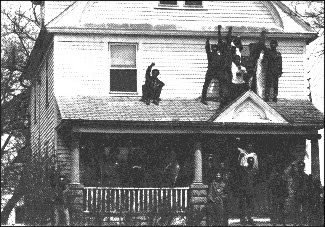
With the rise of BLM and police brutality in the past few years, it’s become more important than ever to be punctual on how we spread diverse knowledge throughout the local community. It’s important to gain knowledge about these aspects, and, luckily, an entire month has become put on the side for that sake of learning about black history. February is officially Black History Month, and has been since President Gerald Ford recognized it during the United States Bicentennial Event on February 10th, 1976. It was originally set up as the “Negro History Week” in February 1926 by Carter G. Woodson, and soon was renamed to Black History month in 1976. February is when it’s celebrated in the USA, while it’s typically celebrated in Ireland and the UK in October, with other kinds of celebrations and education going on over there.
It’s become a month that people have taken to spreading awareness about issues such as racism, discrimination, and major class inequality in American society. Schools, primarily middle and high schools, have dedicated a portion of their studies to learning about black figures in America’s past every February. With this dedicated period, it allows people to fully understand not just what the Civil Rights Movement did for black rights back in the late 1960s; but what black people have done in the past to stand up for their rights even with the constant adversity to their skin color through time. The idea of black resistance shows up a lot throughout this resistance, specifically talking about the oppression after the Civil war – lynchings, hangings, and Jim Crow and laws relating to them were very common.
With that, it’s important for schools to educate students about what happened – not just to ensure history doesn’t repeat itself, but to disclose the atrocities that have happened. Police brutality is still a large part of modern age racism, and is a topic pertaining to this modern age. Spreading awareness about African-American heritage is important so that we can dismantle the racism that is still existent in this day and age. With police brutality and common racism still happening, it’s important to listen to the black voices around us that speak against injustice.
It isn’t just all about raising one’s voices in support of black people, but also learning about the history of black people and how they prospered in the face of danger throughout their own traditions. The Harlem Resistance is a great example of this, exploring the different angles in which African-Americans have reclaimed their own voices in their culture and traditions is admirable, and exploring that is a great way to educate oneself on that.
Black History Month is the time to uplift these voices, listen, and learn from these older stories. There are local events within the community, and spreading awareness of local black owned businesses can help raise the voices of those oppressed from a usual white-centric world. Supporting and raising voices is important, along with understanding how this affects one’s community.
Sources
Research guides: Black history month: A Commemorative Observances Legal Research Guide: History and overview. History and Overview – Black History Month: A Commemorative Observances Legal Research Guide – Research Guides at Library of Congress. (n.d.). Retrieved February 15, 2023, from https://guides.loc.gov/black-history-month-legal-resources/history-and-overview#:~:text=In%201986%2C%20Congress%20passed%20Public,president%20to%20issue%20a%20proclamation
Editors, H. (2010, January 14). Black history Month 2023: Facts, origins & more | history – history. HISTORY. Retrieved February 15, 2023, from https://www.history.com/topics/black-history/black-history-month
President Gerald R. Ford’s message on the observance of Black History Month. President Gerald R. Ford’s Message on the Observance of Black History Month. February 10, 1976. (2002). Retrieved February 15, 2023, from https://web.archive.org/web/20130119095146/http://www.ford.utexas.edu/library/speeches/760074.htm
By Kkhemet – Own work, CC BY-SA 4.0, https://commons.wikimedia.org/w/index.php?curid=57051215
